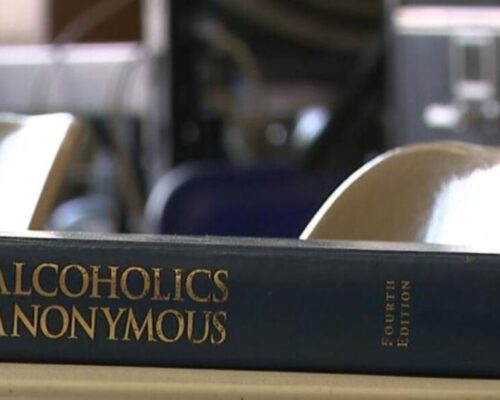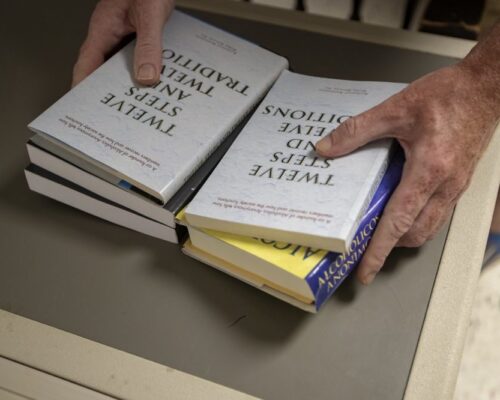About A.A.
Why Try A.A.?
"If you want to keep drinking, that's your business. But if you want to stop ... AA can help."






There are many different kinds of A.A. meetings. Some include a talk by a sober member, recounting his or her personal experiences about what life was like while drinking, what happened to get them to A.A., and what life is like in sobriety. We call this sharing our “Experience, Strength and Hope.” Other kinds of meetings include reading and/or discussion of the book Alcoholics Anonymous.
A.A. is not a religious organization, although some meetings happen to take place in churches. Some are in community centers, Alano clubs, hospitals, or even outdoors. With over 700 meets per week in the Harbor area, there are plenty to choose from. Try several kinds to see what what works for you.
A.A. Preamble
Alcoholics Anonymous is a fellowship of people who share their experience, strength and hope with each other that they may solve their common problem and help others to recover from alcoholism.
The only requirement for membership is a desire to stop drinking. There are no dues or fees for A.A. membership; we are self-supporting through our own contributions. A.A. is not allied with any sect, denomination, politics, organization or institution; does not wish to engage in any controversy, neither endorses nor opposes any causes. Our primary purpose is to stay sober and help other alcoholics to achieve sobriety.
Reprinted with permission of The AA Grapevine, Inc.
Our Solution
12 Steps of Alcoholics Anonymous
Step One
We admitted we were powerless over alcohol - that our lives had become unmanageable.
Step Two
Came to believe that a Power greater than ourselves could restore us to sanity.
Step Three
Made a decision to turn our will and our lives over to the care of God as we understood Him.
Step Four
Made a searching and fearless moral inventory of ourselves.
Step Five
Admitted to God, to ourselves, and to another human being the exact nature of our wrongs.
Step Six
Were entirely ready to have God remove all these defects of character.
Step Seven
Humbly asked Him to remove our shortcomings.
Step Eight
Made a list of all persons we had harmed, and became willing to make amends to them all.
Step Nine
Made direct amends to such people where've possible, except when to do so would injure them or others.
Step Ten
Continued to take personal inventory and when we were wrong promptly admitted it.
Step Eleven
Sought through prayer and meditation to improve our conscious contact with God as we understood Him, praying only for knowledge of His will for us and the power to carry that out.
Step Twelve
Having had a spiritual awakening as the result of these steps, we tried to carry this message to alcoholics, and to practice these principles in all our affairs.
Our Practices
12 Traditions of Alcoholics Anonymous
Tradition One
Our common welfare should come first; personal recovery depends upon A.A. unity.
Tradition Two
For our group purpose there is but one ultimate authority - a loving God as He may express Himself in our group conscience. Our leaders are but trusted servants; they do not govern.
Tradition Three
The only requirement for A.A. membership is a desire to stop drinking.
Tradition Four
Each group should be autonomous except in matters affecting other groups or A.A. as a whole.
Tradition Five
Each group has but one primary purpose - to carry the message to the alcoholic who still suffers.
Tradition Six
An A.A. group ought never endorse, finance, or lend the A.A. name to any related facility or outside enterprise, lest problems of money, property, and prestige divert us from our primary purpose.
Tradition Seven
Every A.A. group ought to be fully self-supporting, declining outside contributions.
Tradition Eight
Alcoholics Anonymous should remain forever non-professional, but our service centers may employ special workers.
Tradition Nine
A.A., as such, ought never be organized; but we may create service boards or committees directly responsible to those they serve.
Tradition Ten
Alcoholics Anonymous has no opinion on outside issues; hence the A.A. name ought never be drawn into public controversy.
Tradition Eleven
Our public relations policy is based on attraction rather than promotion; we need always maintain personal anonymity at the level of press, radio, and films.
Tradition Twelve
Anonymity is the spiritual foundation of all our traditions, ever reminding us to place principles before personalities.
Our Promises
12 Promises of Alcoholics Anonymous
One
We are going to know a new freedom and a new happiness.
Two
We will not regret the past nor wish to shut the door on it.
Three
We will comprehend the word serenity.
Four
We will know peace.
Five
No matter how far down the scale we have gone, we will see how our experience can benefit others.
Six
That feeling of uselessness and self-pity will disappear.
Seven
We will lose interest in selfish things and gain interest in our fellows.
Eight
Self-seeking will slip away.
Nine
Our whole attitude and outlook on life will change.
Ten
Fear of people and economic insecurity will leave us.
Eleven
We will intuitively know how to handle situations which used to baffle us.
Twelve
We will suddenly realize that God is doing for us what we could not do for ourselves.
Are these extravagant promises? We think not. They are being fulfilled among us - sometimes quickly, sometimes slowly. they will always materialize if we work for them.
our guide
12 Concepts of Alcoholics Anonymous
Concept One
Final responsibility and ultimate authority for A.A. World Services should always reside in the collective conscience of our whole Fellowship.
Concept Two
The General Service Conference of A.A. has become, for nearly every practical purpose, the active voice and the effective conscience of our whole Society in its world affairs.
Concept Three
To insure effective leadership, we should endow each element of A.A. - the Conference, the General Service Board and its service corporations, staffs, committees, and executives - with a traditional "Right of Decision."
Concept Four
At all responsible levels, we ought to maintain a traditional "Right of Participation, " allowing a voting representation in reasonable proportion to the responsibility that each must discharge.
Concept Five
Throughout our structure, a traditional "Right of Appeal: ought to prevail, so that minority opinion will be heard and personal grievances receive careful consideration.
Concept Six
The Conference recognizes that the chief initiative and active responsibility in most world service matters should be exercised by the trustee members of the Conference acting as the General Service Board.
Concept Seven
The Charter and bylaws of the General Service Board are legal instruments, empowering the trustees to manage and conduct world service affairs. The Conference Charter is not a legal document; it relies upon tradition and the A.A. purse for final effectiveness.
Concept Eight
The trustees are the principal planners and administrators of overall policy and finance. They have custodial oversight of the separately incorporated and constantly active services, exercising this through their ability to elect all the directors of these entities.
Concept Nine
Good service leadership at all levels is indispensable for our future functioning and safety. Primary world service leadership, once exercised by the foundations, must necessarily be assumed by the trustees.
Concept Ten
Every service responsibility should be matched by an equal service authority, with the scope of such authority well defined.
Concept Eleven
The trustees should always have the best possible committees, corporate service directors, executives, staffs and consultants. Composition, qualifications, induction procedures, and rights and duties will always be matters of serious concern.
Concept Twelve
The Conference shall observe the spirit of the A.A. tradition, taking care that it never becomes the seat of perilous wealth or power; that sufficient operating funds and reserve be its prudent financial principle; that it place none of its members in a position of unqualified authority over others; that it reach all important decisions by discussion, bot, and, whenever possible, be substantial unanimity; that its actions never be personally punitive nor an incitement to public controversy; that it never perform acts of government; and that, like the Society it services, it will always remain democratic in thought and action.